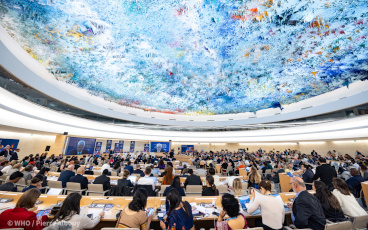Eradicating polio will take renewed resolve, says Gates
In front of an audience of over 10,000 Rotarians, Bill Gates offers praise and caution.
The co-chair of the Bill & Melinda Gates Foundation praised Rotary for its continued success in the effort to eradicate polio, but cautioned that Rotarians will need to redouble their efforts to keep the disease from spreading — and threatening hundreds of thousands of children.
Gates, the keynote speaker at the third plenary session of the 2011 Rotary International Convention, 24 May in New Orleans, Louisiana, USA, said that because of Rotary, there are many places in the world where polio is no longer considered a threat.
“That’s a blessing and a curse,” said Gates. “The blessing is that in many places, polio is a disease of the past. The curse is that it is now harder for us to raise awareness that, in some places, polio is also a disease of the present. If we fail to help leaders around the world understand this, polio is certain to be a disease of the future.”
Gates praised Rotary for reducing the incidence of polio by more than 99 percent worldwide since 1988.
“Your work has brought us so far,” he said. “I’m so proud to be a partner in the work that Rotary has been doing to eradicate polio.”
Gates noted that only one case of polio had been reported in India this year, as of March. “India is approaching zero cases,” said Gates. “None of this would have been remotely achievable had it not been for Rotary. We would not be where we are without you. Nor can we get to where we’re going without you.” More













